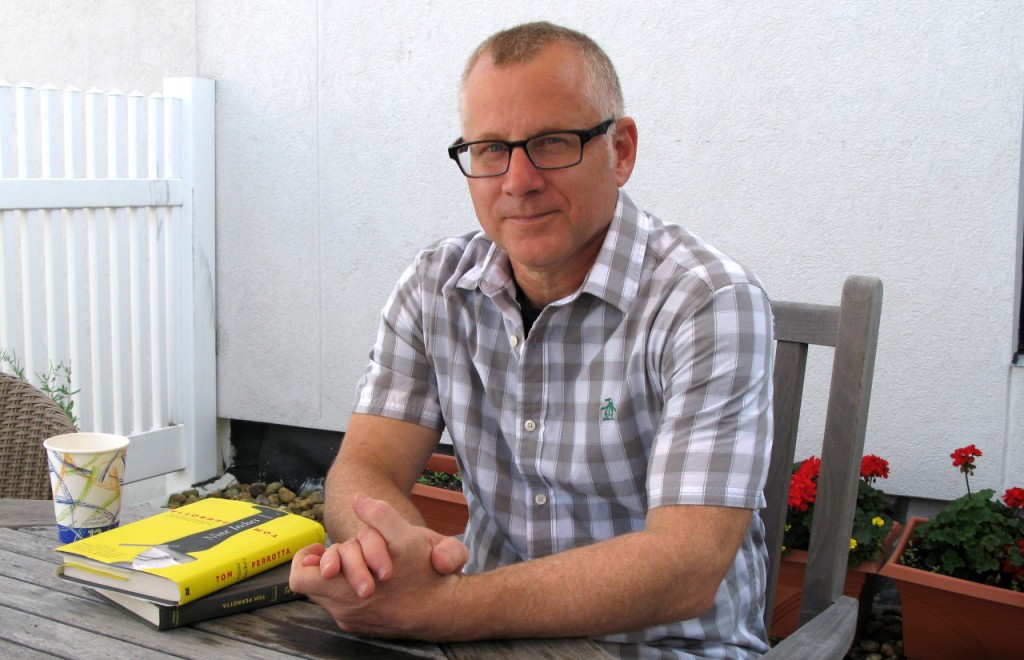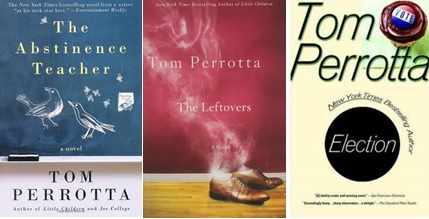I haven’t met a Tom Perrotta book I didn’t like, and I’ve read a lot of them–Bad Haircut (short stories), The Wishbones, Joe College, Little Children, The Abstinence Teacher, The Leftovers. I still need to read Election. Perrotta is not-so-arguably one of the best contemporary authors today. Two of his books (Little Children and Election) became movies. And The Leftovers is now a popular HBO show. Given that success, I wanted to find out a little more about him and his writing process.

On the first thing he ever wrote:
“The first thing I ever wrote that got the attention of the adults in my life was a short illustrated essay I composed in the third grade, from the perspective of the Apollo Thirteen astronauts, during the time when it was unclear whether they’d be able to make it back to earth alive. My essay called for optimism and determination in the face of danger, though I’m sorry to report that it was not the basis for the popular Tom Hanks movie that came out about twenty-five years later. My teacher, Miss Baker, liked it enough to show it to her sister in Japan (this felt like a huge honor at the time, and probably had a lot to do with my deciding to be a writer later in life).” (Source)
On his literary influences:
“When I was in high school during the pot-addled late seventies, I read the usual suspects: Vonnegut, Brautigan, Tolkien, Rod Serling, the guy who wrote Watership Down, whose name is escaping me at the moment. Sophomore year, though, we were assigned a book called Nine Modern Short Novels, which included Heart of Darkness, The Metamorphosis, The Stranger, and The Beast in the Jungle, among others, and those stories made an enormous impression on me. Senior year, a teacher introduced me to Chandler and Hammett, and for a while I only read hard-boiled detective fiction. In college, I immersed myself in nineteenth-century realistic fiction, and then had a brief but intense fascination with Latin American literature. In graduate school I wholeheartedly embraced the tradition of plainspoken American fiction, which stretches from Stephen Crane and Willa Cather to Hemingway to great contemporary writers like Raymond Carver and Tobias Wolff. I can see Carver’s influence quite clearly in my first book Bad Haircut, though it’s less apparent in my last couple of books. On the other hand, I don’t think I could’ve written the ending of Little Children if I hadn’t read stories like ‘A Small, Good Thing.'” (Source)
On the value of writing workshops:
“There’s a lot you can learn from workshops—how to edit other people’s work, how to accept criticism, how to gain some distance on your work. It’s great to have an audience when you’re starting out, and you probably won’t ever get a more attentive group of readers than your workshop colleagues. Some of the best friends I’ve had are people I’ve met in the hothouse of fiction workshops. But like anything else, workshops become frustrating and repetitive after a while; there comes a point when you’re able to internalize the voice of your colleagues, and anticipate their reactions in advance. At that point, you’re better off on your own.” (Source)
On his novel-writing process:
“When I write a novel, I’m pretty steady—it’s a job suited for a tortoise. A little bit today, a little more tomorrow. Usually I have more endurance later in the process, when the novel has begun generating its own momentum. Early on, it’s a struggle to put in three hours a day.” (Source)
On his writing routine:
“I switch back and forth between typing directly onto the computer and writing longhand on legal pads with a fountain pen. Sometimes I’ll move from my desk to the dining room table. I find that even small changes sometimes jog you out of a mental rut.” (Source)
On his best writing advice:
“At some point, I came across a piece of writing advice from Elmore Leonard: ‘Skip the boring parts.’ This really resonated with me, because I’m always painfully aware of those times when I’ve hit a dull patch, and the sentences are lying dead on the page. The thing to do, I’ve discovered, is not to slog through these literary swamps, but to jump over them. Skip ahead in your narrative, switch point of view, do something crazy—any- thing to keep from sinking deeper into the literary muck. If it’s killing you to write something, imagine what it’s going to feel like for someone else to read it.” (Source)
“Keep writing. Don’t be discouraged by rejection. When things don’t go well, it helps to think of yourself as a genius and the rest of the world as a bunch of idiots.” (Source)
On advice he wishes he got:
“I’m tempted to say that I wish someone had told me how hard it would be to get published and make a living before I decided to become a writer, but if someone had done that, I might not have ever started.” (Source)

On how his stories begin:
“I usually start with a situation or a setting. For months before I begin writing, I’ll think to myself, I’m going to write a novel about a wedding band or about young parents on the playground, or about a high school election. The characters come next, and the plot comes after that.” (Source)
On reading:
“I don’t do much reading during the day. I like to read in the evening, preferably while sitting on my screened porch, with a soundtrack of bugs and frogs and passing cars. Reading on planes and trains can be a lifesaver as well.” (Source)
On the book that changed his life:
“I read The World According to Garp when I was 16, and it changed my life. I was an avid reader at the time and a would-be guitar player, but Garp allowed me to articulate a new ambition: I wanted to be a writer, and by writer I meant both Garp and John Irving.” (Source)
On struggling with writing:
“When I’m struggling with my own work, I’m often drawn to biographies of writers. Not only do I learn fun facts about prominent figures — Henry James suffered terribly from constipation, Kafka chewed every bite of food 32 times, Flannery O’Connor cared for a flock of around 40 peacocks, Montaigne never saw his wife with her clothes off, Balzac fortified himself with a paste made of unroasted coffee beans — I’m also reminded that there’s no single path for living a successful creative or personal life. It’s inspiring to read about a flawed human being who struggled with his or her demons and afflictions, experienced paralyzing episodes of failure or self-doubt, but somehow managed to do the work anyway, and produce something that enriched the world. That’s my version of self-help.” (Source)
Fun facts:
- He was raised Roman Catholic (which probably has something to do with the exploration of religion in his books)
- He knew from a young age that he wanted to be a writer
- He got his B.A. in English from Yale in 1983
- He got an M.A. in English/Creative Writing from Syracuse–Tobias Wolff was one of his teachers
- He wrote 3 books before he got 1 published
- He had trouble getting Election published. It wasn’t until it was optioned as a screenplay in 1996 that publishers took it on as a book
- His favorite writers include: Cervantes, Tolstoy, Balzac, Henry James, Flannery O’Connor, Dashiell Hammett, Willa Cather, John Cheever, James Baldwin, Philip Roth, Raymond Carver, Alice Munro and Tobias Wolff (Source)
- If he could meet any character from literature, it would be Holden Caulfield: “I’d like to find out what he does for a living” (Source)
Want more? Hear from the man himself:
